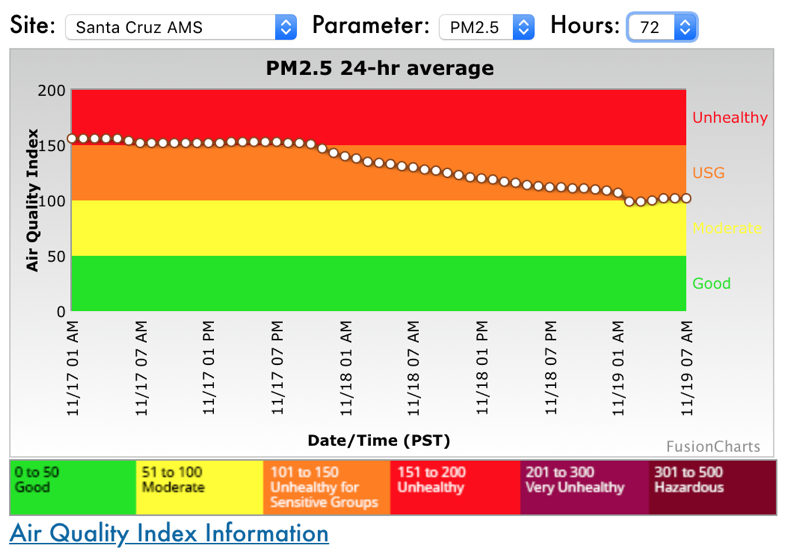Campus News
Campus air quality
Over the next several days, the air quality in the region is expected to reach “Unhealthy for Sensitive Groups” to “Unhealthy” overnight and into the morning.

Smoke from multiple northern California fires is impacting our local air quality. The Air Quality Index (AQI) generated by the EPA’s AirNow system provides general air quality ranges along with corresponding health messages. Over the next several days, the air quality in the region is expected to reach “Unhealthy for Sensitive Groups” to “Unhealthy” overnight and into the morning.
For air quality levels that are “Unhealthy for Sensitive Groups,” the EPA advises people to keep outdoor activities light and short and that anyone feeling symptoms from poor air quality should go indoors.
For areas with “Unhealthy” air quality levels, the EPA advises that some members of the general public may experience health effects; members of sensitive groups may experience more serious health effects.
The AQI for campus locations and the Santa Cruz area is likely to continue changing over the next few days.
At the current air quality level, some people may be more comfortable staying inside and minimizing exposure to outdoor air. Others with preexisting medical conditions that may be exacerbated by elevated airborne particulates are encouraged to follow recommendations from their medical provider.
Campus affiliates with respiratory illness, other medical conditions that may be exacerbated by smoke exposure, and any others that may be concerned about their smoke particulate exposure may pick up filtering masks (N95s) from the following locations:
| • | McHenry Library: Circulation Desk |
| • | Science and Engineering Library: Circulation Desk |
| • | Bay Tree Bookstore: Help Desk |
Larger, departmental, requests can be submitted through the N95 request form.
An eCourse has been developed to provide information on best practices during smoke events and how to properly use N95s. The training is available through the UCSC Learning Center.
Employees can contact EH&S at ehs@ucsc.edu or 459-2553 for assistance with respiratory protection.
Students who may be experiencing respiratory distress should consult with the Student Health Center or their personal medical provider. If you are experiencing significant imminent health issues, dial 911. Detailed information on after-hours health care for students can be found on the Student Health Center website.
Where possible, reduce prolonged or heavy exertion outdoors, consider staying inside, and keep windows and doors closed during times of heavy smoke. Contact your supervisor or manager if you need to work remotely due to smoke levels in your building.
Environmental Health & Safety will continue to monitor local air quality and update the UC Santa Cruz community as significant developments occur.
Resources:
| • | UCSC Air Quality Monitoring |
| • | EPA AirNow AQI Basics |
| • | EPA AirNow Fire and Smoke Map |
| • | Clarity Openmap Air Quality Data |
| • | UCSC Emergency Procedure – Building Fire and Wildland Fire |